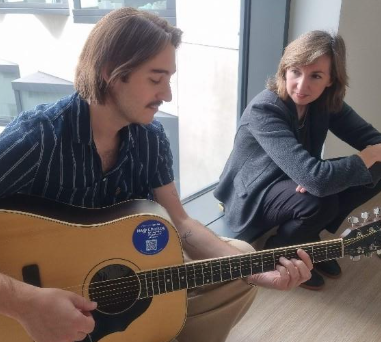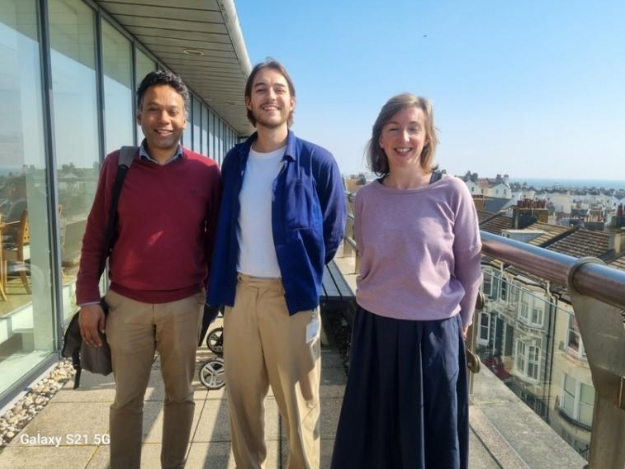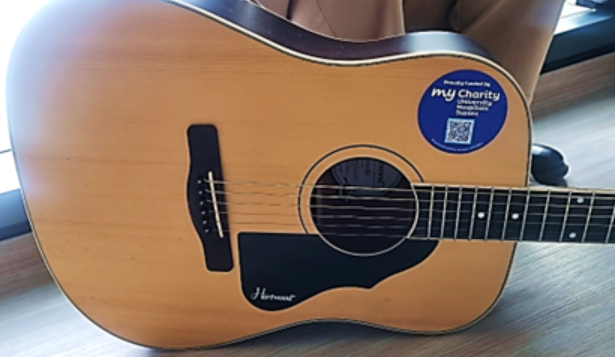Recently My Charity’s Legacy Officer, Ruby Chowdhry, visited the Neurology Ward at Royal Sussex County Hospital to see music therapy in action.
Thanks to generous donations left by individuals in their Will, My Charity is able to improve the care and experience of patients across our hospitals. A legacy donation left to support the wellbeing of people experiencing neurology disorders is making a difference to individuals currently being cared for in Brighton. Below, Ruby shares her experience of visiting the ward during a music therapy session:
Entering the ward at the Royal Sussex County Hospital on a bright Thursday morning, I hear the familiar hum of hospital sounds: buzzing and bleeping of machines, hushed voices of nursing staff and patients pressing buttons for attention. The healthcare assistants, dressed in cloudy grey uniforms, are clinking crockery as they tidy away the morning’s breakfast. This is a quiet symphony of sound in an otherwise tranquil ward, framed by a sea-view overlooking the English Channel, through windows the length and breadth of an entire wall. If ever there were a sight in Brighton, who’d have thought it would be here on the 10th floor of a neurology department in the new Louisa Martindale Building, Royal Sussex County Hospital!
I meet our newly appointed consultant neurologist, Dr Eva Bunting and music therapist in residence, Joseph Jezard. I follow on through the ward as Joe meanders between bedsides, with his trusty guitar slung over one shoulder, exuding a peaceful offering to play some music with patients. These are sounds that might act as distraction and entertainment. Perhaps Joe will ‘jam’ with a patient who’s connected with his guitar playing, in some cases there is musical riffing whereby a patient, who might be staring glacially into the distance one minute yet tapping along to a strum of the guitar in the next.
A specialist in movement disorders at our Trust, Eva completed undergraduate medical training at the University of Sheffield and undertook the majority of her postgraduate training in Brighton and London Hospitals. Eva understood the ‘uncertainty’ that patients with neurological dysfunction often face, in addition to the anxiety of an often-protracted hospital stay whilst waiting for diagnostic results and undergoing rehabilitation.

A common movement disorder, Parkinson’s Disease, is often treated with medication, but it is thought that music can encourage a nuanced movement and articulation. In 2023, a report by Nordoff and Robins at King’s College Hospital observed that patients stepping down from Intensive Care Units benefited from music as a way to ‘engage with music, support relaxation…provide emotional support…and improve sense of wellbeing’ (pp7-9, Nordoff and Robbins, 2023). Piloted by music therapist, Kerry Atchison, the results were compelling; significant patterns of arousal were seen in patients normally unresponsive, but who were showing signs of interaction with music.
The evidence from the report, spurred by her enduring friendship with Kerry, sparked an idea in Eva to bring music therapy to patients in Brighton. She was championed by her fellow neurology consultant colleague, Dr Romi Saha. Introduced to Joseph Jezard (Joe), also a music therapist with Nordoff and Robbins, Joe holds an MSc in Music Therapy and has experience in working alongside patients with neurological conditions at hospitals in the South of England. He too found revelatory experiences through his patient group via the power of music as therapy: “We are brought up to listen to music passively, but the best parts are engaging. It isn’t just about making something but reshaping the way we (as people) can be in the world. People with life changing diagnoses can shift from doing nothing to doing something. We confirm, celebrate and develop this through music. Lots of illnesses close down opportunities but music can meet anyone anywhere. It can reopen people up in physical, social, psychological and emotional ways.“
The scale of diagnoses in patients with neurological conditions are diverse, ranging from autoimmune encephalitis to spinal cord injuries, Parkinson’s disease to multiple sclerosis. These conditions not only affect physical functioning but often cause anxiety and depression. Physical functioning and psychological wellbeing are intrinsically intertwined and in some individuals music can be a powerful tool to re-establish neural connectivity and allow healing and restoration.
A unique question that Joe wants to address is, ‘how do I musicalize their condition?’ He asks: “If a patient has a tremor, can I accompany the tremor so as not intrude on the tremor, but compliment their movement. My role is about finding a way to explore how a therapist can respectfully connect.”
Joe describes how he will sit with a bed-bound patient, and try to connect with their pain, hearing their tone of wailing and strumming a matching note. Without intruding, he will play to the rhythm as accompaniment. Soon the patient begins to jam along to their own sound of music, exploring and releasing emotions.
The evaluation report for 2025 has a total of 34 unique attendees who have been part of the music therapy project, however it is also staff members who have commented on the difference of their patients, one employee quite taken aback with such transformation in their patient group: “I have never seen our patients look so happy and so engaged…a total transformation”.
If clinical management of patients in neurological conditions can be challenging for both patient and parent or carer, music therapy can offer the patient a way to connect alongside the expertise of a clinician. Music can cross boundaries.

If you’d like to help transform lives for the next generation through a legacy gift in your will, send us an email at uhsussex.charity@nhs.net or read our legacy pack to find out more information.


